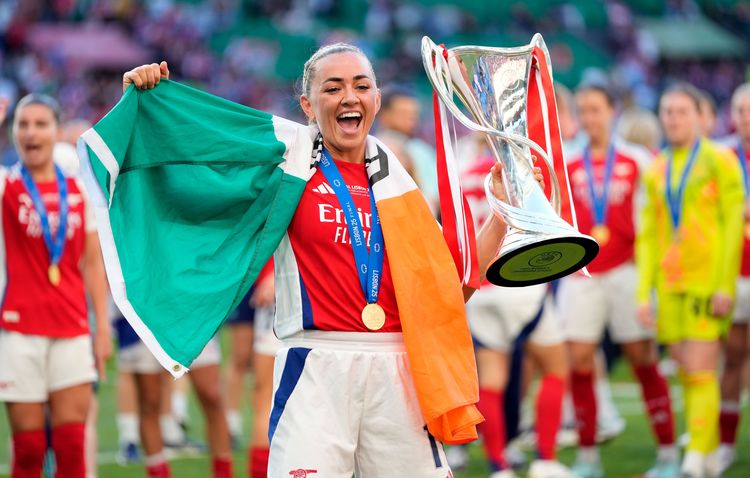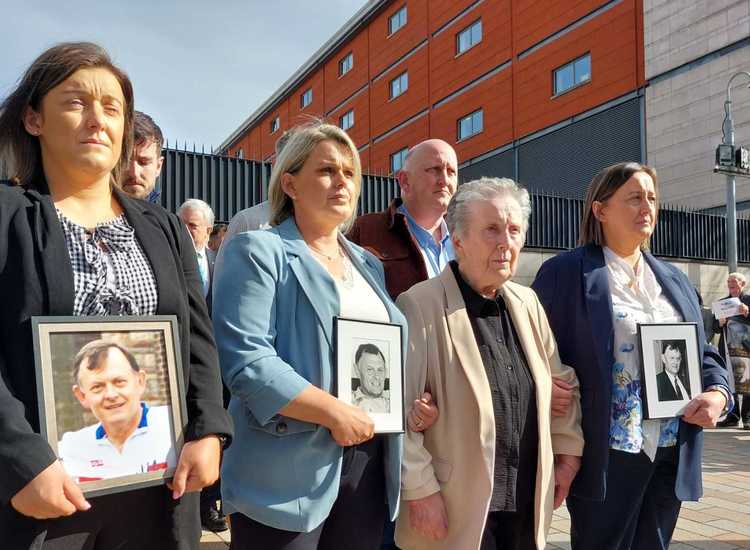By Earle Hitchner
The greatest comeback in the history of Irish traditional music took place on May 29, 1994, at the 18th annual Washington, D.C., Irish Folk Festival in Wolf Trap, Vienna, Va. That was the date and venue of Boston-born Joe Derrane’s return to public performance on the D/C# button accordion after a gap of 35 years. No one who witnessed his performance that day will ever forget it.
At the time, Joe was 64 years old and had been retired from his day job at the Massachusetts Bay Transportation Authority since 1988. By his own admission, he had also been retired from music since 1990. Wolf Trap changed that.
Between 1994 and 2006, Joe Derrane issued six recordings: “Give Us Another” (with pianist Felix Dolan) in 1995, “Return to Inis Mor” (with pianist Carl Hession) in 1996, “The Tie That Binds” (with guests Kevin Crawford on flute and whistle, Seamus Egan on tenor banjo, Frankie Gavin on fiddle, Jerry O’Sullivan on uilleann pipes, Zan McLeod on guitar and bouzouki, and Carl Hession on piano) in 1998, “Ireland’s Harvest” (with Frankie Gavin and pianist Brian McGrath) in 2002, “The Boston Edge” (with fiddler Seamus Connolly and guitarist-mandolinist John McGann) in 2004, and “The Man Behind the Box” (with John McGann) in 2006.
Those albums bear no whiff of a musician in retirement. If anything, they represent a period of monumental rejuvenation and have reacquainted the world with genius, a term chosen by leading Irish-American traditional music scholar Mick Moloney to describe Joe Derrane.
He created the best music of his career during that time. What makes that statement seem so audacious, even hyperbolic, is that the 78-rpm recordings of Irish traditional music that he made from 1946 to the mid-1950s are rightly deemed classics. How is it I possible that someone who made those 78’s could take three and a half decades off from playing the button box and then return to make new recordings on it that eclipse the old ones?
Mick Moloney is right: Joe Derrane is a genius. It’s the only plausible explanation, and Mick and I are not alone in thinking so. Mairtin O’Connor, Jackie Daly, and Billy McComiskey, three supremely talented Irish button accordionists, concur.
After meeting Joe Derrane in Galway, O’Connor dedicated “Shop Street,” a “swing jazz elongated hornpipe” he composed, to “this legend, who has inspired many people.”
Jackie Daly, stunned by Derrane’s virtuosity on hornpipes, once quipped to me: “You can get seasick listening to Joe’s triplets.” Then, after our laughter subsided, Daly confessed: “I can’t do what Joe does on the box. Nobody can.”
As I waited nervously in the hospital while my 86-year-old mother was in surgery for a broken femur recently, I got a cell-phone call from Billy McComiskey. It cheered me up. “I’m trying to learn one of the reels Joe wrote,” Billy said to me, “but there’s no way I can duplicate how he plays it. He’s so far ahead of his time, I swear he has a rocket tied to his butt.” (Billy used a shorter, saltier synonym for “butt.”)
Besides jigs, reels, hornpipes, barndances, waltzes, and a clog, Joe has composed and recorded two pastiches and, on his new album “Grove Lane,” a tango. Perhaps the closest living non-Irish accordion counterpart to Joe Derrane is 59-year-old, Cannes-born Richard Galliano, who shares Derrane’s conviction that an accordion is capable of much more musically. As Galliano continues to breathe fresh life into the French accordion with his “new musette” and “all-terrain” style, Derrane continues to breathe fresh life into the Irish accordion with his own unique style.
That’s obvious throughout his seventh post-comeback album, “Grove Lane,” released on Oct. 26 by Compass Records. With John McGann backing impeccably on acoustic guitar, this new recording will doubtlessly elicit a new wave of appreciation and encomium for the music of Joe Derrane, who turned 80 years old this past March 16.
His fondness for and finesse on hornpipes come across resplendently in “The Autograph / The Low Level.” He plays them with heart-gladdening, even impish agility, executing beautiful bursts of triplets within an astonishing command of rhythm and tempo. The detail mirrors the drive, never too fast, never too slow, and the swing encasing both is exhilarating. In the long, lustrous history of Irish traditional music, Joe Derrane is the undisputed hornpipe king.
“Fancy Free / Grove Lane” are two of seven tunes composed by Derrane on the album. The first is a schottische, the second is a barndance, and together they demonstrate how utterly in sync Joe is with the desires of dancers. There’s a sweet glide to the ride he provides, and his ornamentation offers a rich dividend of close listening pleasure right down to his fun flourish of a coda.
The lift and flow in his four medleys of reels and four medleys of jigs would compel a statue to tap its feet. The reels “Return to Miltown / Kit O’Connor’s / Jackson’s” and the jigs “Mac’s Fancy / The Monaghan” teem with a breathtaking blend of dexterity, vibrancy, and invention, all holding securely to the essence of the tune. One of Derrane’s hallmarks is cleaving to melody while simultaneously unleashing his imagination. He never gets that delicate, hard-to-achieve balance wrong.
The album track that will probably garner the most attention is “Tango Derrane.” This tune, composed by Derrane, is a tour de force, where he seamlessly plays the Irish button box on a seductive, Argentinean-influenced dance rhythm of his own fashioning. Once humorously described as a “vertical expression of a horizontal desire,” the tango had its greatest recent expression in the bandoneon brilliance of Astor Piazzolla (1921-1992). I suspect Piazzolla would have smiled in approval of “Tango Derrane,” which also features John McGann’s impressively responsive guitar accompaniment.
The emotional center of “Grove Lane,” however, is “Waltzing with Anne,” written by Joe for his Longford-born wife, who shared his home for nearly half a century on Grove Lane in Randolph, Mass., before passing away in 2008. It is a melody with lovely flowing lines, tinged in sadness, that summon unfaded images of Roxbury’s Dudley Street era of graceful ballroom dancing.
“Grove Lane” further affirms what is now a universally voiced observation: There is only one Joe Derrane. His remarkable story continues, brighter and more fascinating with every recording he’s issued since Wolf Trap brought him back to us.
In a year already teeming with great Irish traditional recordings, Joe Derrane’s “Grove Lane” is the best album I’ve heard so far in 2010.
The CD (catalog no. 745442), for which I wrote an essay gratis, is available on Compass Records, 916 19th Avenue South, Nashville, TN 37212, 615-320-7672, www.compassrecords.com.
A concert for the ages
At 7 p.m. on Sat., Nov. 13, Mick Moloney, Joanie Madden, Seamus Egan, Billy McComiskey, Seamus Connolly, John Doyle, Brian Conway, Jerry O’Sullivan, John Whelan, Felix Dolan, Brendan Dolan, Tommy O’Sullivan, John McGann, Rose Flanagan, Patty Furlong, Margie Mulvihill, and stepdancers Joe Dwyer and Melanie Deegan will perform at a special tribute concert to Joe Derrane at the Fairfield Theatre Company, Stage One, 70 Sanford St., Fairfield, CT 06824. For tickets to this once-in-a-lifetime event, call 203-259-1036. Also visit www.fairfieldtheatre.org.









